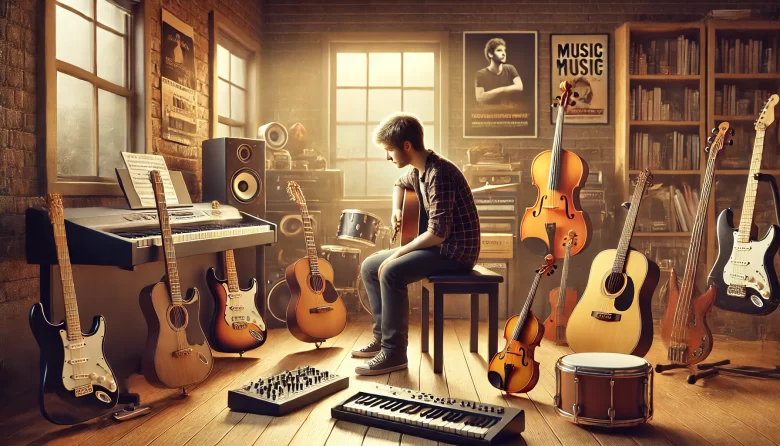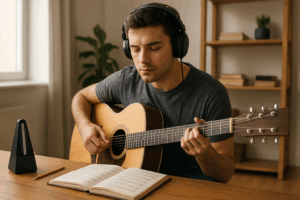Starting your musical journey is thrilling — and one of the first big questions you’ll face is: Which instrument should I learn? With so many incredible options out there, choosing just one can be both exciting and confusing.
Whether you’re drawn to the expressive sound of a violin, the rhythm of drums, or the versatility of the guitar, finding the instrument that best suits your personality, lifestyle, and goals is essential. A well-chosen instrument can make learning more enjoyable and increase the chances that you’ll stick with it long-term.
Here are some key factors to consider as you decide which instrument is right for you.
1. Understand Your Musical Interests
Before anything else, think about what kind of music you enjoy listening to. Your favorite genres can guide you toward an instrument that fits your style and inspires you to practice.
Ask Yourself:
- What music do I listen to most?
- Which instruments stand out to me in those songs?
- Are there specific artists or bands I admire?
For example:
- If you love pop or rock, guitar or drums might be a good fit.
- If you’re into classical music, piano or violin could be ideal.
- Jazz fans might gravitate toward saxophone or upright bass.
- If you’re inspired by singer-songwriters, maybe you’d enjoy learning guitar or piano as accompaniment instruments.
Let your passion guide you. When you’re excited about the sound you’re creating, practice becomes a pleasure, not a chore.
2. Consider Your Personality and Learning Style
Believe it or not, your personality can influence which instrument will feel the most natural for you.
Extroverted or Social?
If you enjoy being part of a group, consider an instrument that’s popular in bands or orchestras:
- Trumpet, saxophone, or drums for a jazz or marching band.
- Violin, viola, or cello for orchestras.
- Guitar or bass for rock bands.
More Introverted or Independent?
Solo-friendly instruments may suit you better:
- Piano is perfect for solo practice and performance.
- Classical guitar allows for beautiful solo arrangements.
- Voice — if you’re a singer — can be trained privately and then performed with or without accompaniment.
Also consider whether you prefer structure or freedom:
- If you like clear rules and structure, you might enjoy classical instruments like piano or violin.
- If you’re creative and like to improvise, try guitar, keyboard, or drums — great for experimenting and composing.
3. Think About Your Environment and Space
The practicality of owning and practicing an instrument plays a major role in your success. Before committing, take a look at your surroundings.
Questions to Ask:
- Do I have space for a large instrument like a drum set or piano?
- Can I play at home without disturbing others?
- Will I need a quiet or portable option?
Some instruments require more space, soundproofing, or setup than others:
- Digital piano: Great alternative to an acoustic piano for small spaces.
- Acoustic guitar: Compact, portable, and relatively quiet when played softly.
- Electric instruments (guitar, keyboard): You can practice with headphones.
- Drums or brass instruments: Loud, so consider soundproofing or electric versions for quiet practice.
4. Consider Budget and Maintenance
Musical instruments can vary significantly in price, both for the initial purchase and long-term maintenance.
Entry-Level Budget-Friendly Instruments:
- Ukulele
- Keyboard (digital)
- Acoustic guitar
- Recorder or harmonica
These are inexpensive to start with and don’t require costly upkeep.
Higher-Cost Instruments:
- Acoustic pianos
- Violins, cellos, and wind instruments (due to maintenance and accessories)
- Drum kits
Also consider accessories: stands, tuners, cases, reeds, pedals, amps, etc. Instruments like violins and guitars need regular tuning and occasional part replacements. Wind instruments may require professional cleaning and adjustments.
Rental Options
If you’re unsure, renting an instrument can be a smart first step. Many music stores offer monthly rental programs that allow you to try an instrument before committing fully.
5. Think About Age and Physical Ability
Some instruments are more physically demanding than others, and age can influence which one is best to start with.
For Younger Children (Under 10):
- Ukulele: small, easy to hold
- Keyboard: great for learning notes and coordination
- Violin (1/4 or 1/2 size): ideal for classical training
- Percussion instruments: fun and easy to engage with
For Teens and Adults:
- Any instrument is an option, as strength and coordination are better developed.
- Adults might prefer guitar, voice, piano, or wind instruments depending on taste and physical ability.
Consider Physical Comfort
- Wind instruments require breath control — great for those with good lung capacity.
- String instruments require hand strength and finger flexibility.
- Piano and guitar need hand coordination but are generally beginner-friendly.
If you have any physical limitations (e.g., joint pain, mobility issues), look for instruments with ergonomic designs or those that require less strain on the body.
6. Try Before You Decide
The best way to know if an instrument suits you is to actually try it. Most music schools and local stores allow beginners to test out instruments. Feeling how it fits in your hands, how it sounds, and how much effort it takes to produce a note can be eye-opening.
Here’s What to Do:
- Visit a music store and try multiple instruments.
- Watch beginner tutorials on YouTube to get a feel for technique.
- Borrow from a friend or rent from a local music program.
- Take a trial lesson or attend a workshop.
Trying a few instruments can quickly reveal what feels right. You might be surprised — sometimes people discover a love for an instrument they never expected!
7. Don’t Overthink It — Just Start
While research is helpful, don’t get stuck in “analysis paralysis.” The most important step in your music journey is to start. Any instrument you choose will teach you valuable skills and open your ears to new sounds.
You can always switch or add instruments later. In fact, many musicians are multi-instrumentalists. The skills you build on one instrument often transfer to others — especially with rhythm, ear training, and theory.
Your Instrument, Your Voice in Music
Choosing your first instrument is a personal decision, and there’s no one-size-fits-all answer. The key is to pick something that excites you, feels comfortable, and fits into your life.
Music is about expression, creativity, and joy. Whatever you choose, know that you’re making an incredible investment in yourself. Be patient, explore freely, and most importantly — enjoy the process.
Your instrument is your partner in this journey. Let it help you find your unique voice in the world of music.




